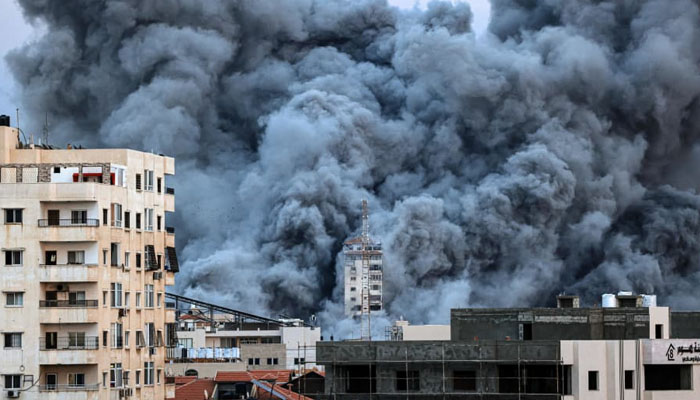Oil prices hike amid Israel-Hamas war, fueling supply fears
Hamas attack and Israel's declaration of war in response to it have left more than 1,000 dead
After Hamas carried out a surprise strike on Israel over the weekend, raising fresh concerns about tensions in the Middle East, oil prices rose while the US dollar and yen advanced on Monday.
The crisis fanned concerns about supplies of crude from the region at a time when supply worries are already high owing to Saudi Arabia and Russia's output cuts.
It has also renewed fears about the impact on inflation, with energy costs a key driver of spiking prices, giving a fresh headache to central banks as they try to ease up on interest rate hikes to avoid recessions.
The surprise attack and Israel's declaration of war in response to it have left more than 1,000 dead and raised concerns that a potential broadening of the conflict could draw in the United States and Iran.
"Key for markets is whether the conflict remains contained or spreads to involve other regions, particularly Saudi Arabia," said ANZ Group's Brian Martin and Daniel Hynes.
"Initially at least, it seems markets will assume the situation will remain limited in scope, duration, and oil-price consequences. But higher volatility can be expected."
Both main contracts surged more than 5% in early Asian business before easing back as the day wore on.
However, SPI Asset Management's Stephen Innes warned, "Historical analysis suggests that oil prices tend to experience sustained gains after the Middle East crises.
"Meanwhile, stocks tend to eventually recover and trend higher after an initial period of volatility. Safe-haven assets like gold and Treasurys, which initially see gains during such crises, tend to fade from their initial price spikes as the situation stabilises."
"But with Middle East analysts considering this to be a pivotal moment for Israel, the view looks incendiary in any current scenario."
A decidedly risk-off mood also saw investors push into the safety of the dollar, which was up against the pound and euro, as well as the Australian and New Zealand dollars.
The yen, considered one of the safest currencies, strengthened against the greenback, though it still remains locked around 11-month lows.
Gold, another key haven, gained around 1%.
Equity markets were mixed, with Shanghai dropping on its first day back after a week-long holiday as investors continue to fret over the stuttering Chinese economy.
There were also losses in Mumbai, Singapore, Manila, Bangkok and Wellington, though Hong Kong rose in shortened trade, having been closed in the morning owing to a typhoon.
Sydney and Jakarta eked out gains. Tokyo was closed for a holiday.
London edged up while Paris and Frankfurt were lower.
The tepid performance came despite a rally on Wall Street, where traders welcomed data showing a forecast-busting jump in new jobs but wage growth slowing.
The "Goldilocks" figures — neither too strong nor too weak — lifted optimism the world's top economy can avoid a recession even as the Federal Reserve keeps rates elevated.
Still, there are worries the bank will hike one more time before the end of the year, with officials determined to bring inflation to heel and keep it at their 2% target.
Key figures
West Texas Intermediate: UP 3.0% at $85.24 per barrel
Brent North Sea crude: UP 2.6% at $86.77 per barrel
Hong Kong - Hang Seng Index: UP 0.2% at 17,517.40 (close)
Shanghai - Composite: DOWN 0.4% at 3,096.92 (close)
London - FTSE 100: UP 0.1% at 7,503.68
Tokyo - Nikkei 225: Closed for a holiday
Euro/dollar: DOWN at $1.0523 from $1.0588 on Friday
Pound/dollar: DOWN at $1.2171 from $1.2234
Dollar/yen: DOWN at 149.16 yen from 149.30 yen
Euro/pound: DOWN at 86.48 pence from 86.52 pence
New York - Dow: UP 0.9 percent at 33,407.58 (close)
Bloomberg news contributed to these figures.
-
Global memory chip crunch puts spotlight on Apple; Will iPhone become more pricey?
-
Bitcoin plummets toward $60,000 as investors dump risky bets
-
Bitcoin crashes below $63K as regulatory pressure and market fears grow
-
Bitwise Crypto Industry innovators ETF: What investors should do in 2026?
-
Nintendo shares slide again as momentum fears grow
-
Gold, silver prices fallen sharply; What’s driving the drop?
-
Gold’s record climb: Experts question if its safety is ‘overstated’
-
Dubai unveils plans to construct street built with real gold












